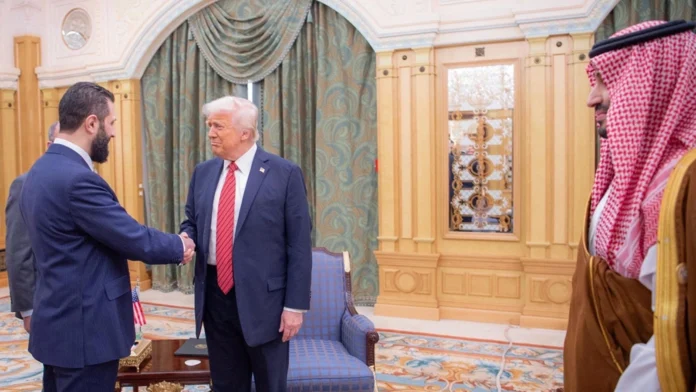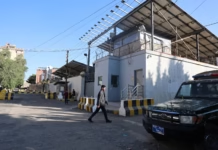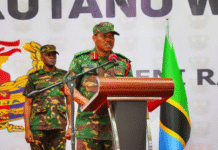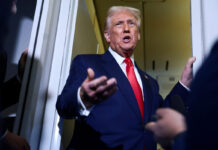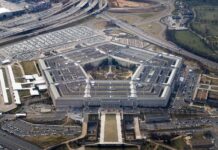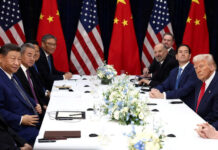In a surprise move characteristic of his political style, former U.S. President Donald Trump announced Tuesday in Saudi Arabia that he would lift all U.S. sanctions on Syria, a war-ravaged nation still reeling from more than a decade of civil conflict. The declaration has not only shocked officials across the Middle East but also caught parts of the U.S. government flat-footed, sparking confusion and uncertainty in Washington.
The announcement — made during Trump’s high-profile visit to Riyadh — came without prior notice to key departments tasked with implementing such a sweeping policy shift. According to four U.S. officials, senior staff at both the State Department and Treasury Department were left scrambling to interpret the decision, as no directive or memorandumhad been circulated in advance.
“Everyone is trying to figure out how to implement it,” said one U.S. official, describing the atmosphere in Washington as chaotic in the aftermath of the announcement.
The White House had not prepared the departments responsible for sanctions administration, leaving officials unclear on which sanctions were being lifted, the timing of the rollback, or how the process should begin. Some policymakers were still in the dark even as Trump met interim Syrian President Ahmed al-Sharaa the following day, also in Saudi Arabia.
Sharaa — who replaced Bashar al-Assad after his ouster late last year — has long been a controversial figure, given his past ties with al Qaeda, despite severing them in 2016. His rise to power had led to speculation about a possible U.S. policy shift, and internal memos had been drafted in preparation for potential easing of sanctions. However, the lack of clear communication from the White House left departments unprepared.
According to a senior White House official, both Turkey and Saudi Arabia had lobbied Trump to meet with Sharaa and lift sanctions. Trump, who described the move as a chance to “give Syria a better future,” tied the relief to a set of strict preconditions.
In a readout of the Trump–Sharaa meeting, the White House said the U.S. president demanded that Syria:
- Expel all foreign terrorists,
- Deport Palestinian militants, and
- Assist in preventing the resurgence of ISIS.
The Caesar Syria Civilian Protection Act, passed in 2019 and extended just months ago, imposes some of the most comprehensive sanctions in U.S. history. While the president can suspend provisions for national security reasons, overturning the act entirely would require congressional approval.
“Unwinding Syria’s sanctions regime will be immensely complicated,” said Edward Fishman, a former State Department official and sanctions expert. “The sanctions are layered, spanning decades of legislation and executive orders. It won’t be quick or clean.”
Fishman, author of Chokepoints, added that the Treasury Department may opt for general licenses to temporarily suspend certain sanctions, much like it did during the Iran nuclear deal in 2015. However, he warned that not all sanctions will likely be lifted, particularly those targeting specific individuals or entities linked to terrorism.
Despite the announcement, there is no imminent timeline for lifting the measures. Trump’s conditions suggest that the rollback could unfold over months or even years, depending on Syria’s compliance with U.S. demands.
Removing Syria from the State Sponsors of Terrorism list, for instance, would involve a complex legal process, and re-establishing financial channels would require international coordination. With the country largely cut off from global banking systems and heavily sanctioned under both U.S. and multilateral regimes, restoring economic normalcy will be an uphill task.
Meanwhile, the State and Treasury Departments remain in limbo, awaiting guidance on how to proceed with an announcement that may shift U.S. foreign policy in the Middle East — once again — in a dramatic and unilateral direction.
Trump’s move, while bold, raises key questions:
- Will Congress support or challenge the suspension of the Caesar Act?
- How will Syria comply with the U.S. demands, especially amid internal instability?
- And most critically, can this diplomatic gamble result in tangible gains for Syria’s long-suffering civilian population — or will it unleash further geopolitical friction?
For now, one thing is clear: America’s Syria policy has entered a new and uncertain chapter, written, as ever, in the bold and unpredictable script of Donald J. Trump.









